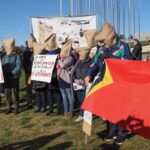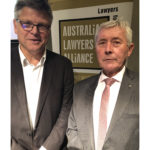National Security Law Permitting the Secret Trial of Witness J Is Under Scrutiny

There has been a sustained national debate about whistleblower prosecutions over the last few years, with a chief concern being the national security laws that permit the trials of Witness K, Bernard Collaery and David McBride to be shrouded in secrecy.
But the clandestine criminal prosecution that takes the cake is that of the former Commonwealth official known as Witness J, who was tried, convicted and sentenced in the ACT Supreme Court without the public knowing, and transcript of proceedings then being withheld.
Tried under the pseudonym Alan Johns, Witness J went before the court in 2019. The ex-intelligence agent had been issued with a high-level security clearance. But following a periodic review, this was revoked due to concerns about his conduct and his employment was then terminated.
After he lost his job, Witness J made a series of complaints to the agency about his unfair treatment via unsecure means, which could have endangered the lives of others. And this led to him being taken into custody and charged with multiple counts of breaching national security arrangements.
Once the case came to light, the secrecy around it led commentators to reaffirm that secret trials have no place in a liberal democracy, like Australia, where open justice is considered a key element of the rule of law.
And due to the widespread misgivings about the case, the Independent National Security Legislation Monitor is now reviewing the law that permitted the closed court arrangements, which is contained in section 22 of the National Security Information (Criminal and Civil Proceedings) Act 2004 (Cth).
Secrets upon secrets
Witness J pleaded guilty to five unknown charges that have together been labelled as “mishandling classified information”. He was subsequently sentenced to 2 years and 7 months imprisonment in the ACT, and was released after 15 months for good behaviour.
“We only found out about that case as a result of a fortunate coincidence,” Human Rights Law Centre (HRLC) senior lawyer Kieran Pender told Sydney Criminal Lawyers last week. And he added that it’s promising that the INSLM is now reviewing the secrecy provision.
The Alan Johns trial only came to public attention after Witness J made a complaint to the courts about a decision by the Australian Federal Police to raid his cell in Canberra’s Alexander Maconochie Centre in February 2019 in order to confiscate a memoir that he’d written.
In November that year, Senator Rex Patrick put questions about the case to then attorney general Christian Porter, who outlined in his reply that he’d provided consent for the prosecution to proceed, that all parties had agreed to the secrecy order, and that J chose his own lawyer.
“The NSI Act balances the need to protect national security information with the principle of open justice and gives the court wide powers to make orders it considers appropriate about such matters,” Porter explained.
The INSLM review
Section 22 of the NSI Act provides that at any time during criminal proceedings the attorney general, the prosecutor and the defendant “may agree to an arrangement about the disclosure, protection, storage, handling or destruction, in the proceeding, of national security information”.
As part of the review, current INSLM Grant Donaldson SC held a public hearing on 21 June this year with a number of interested parties, which included input from Pender.
The lawyer told the INSLM that in the HRLC’s view there is no place for secret trials in this country, and the NSI Act needs urgent reform, following the Witness J scenario. And he underscored that the principle of open justice is of particular relevance in the criminal context.
The Human Rights Law Centre made three safeguard recommendations, which included appointing an open justice advocate, imposing a requirement for the court to give public reasons as to why a secrecy order should be applied, and for a “secret judgements library” to be established.
“The core point is there has to be some openness,” Pender said during his testimony. “We do not accept there are ever circumstances that would justify these arrangements repeating themselves.”







